“Some changes look negative on the surface but you will soon realize that space is being created in your life for something new to emerge”
– Eckhart Tolle, a spiritual teacher and best selling author of ‘The Power of Now’ and ‘A New Earth: Awakening to Your Life’s Purpose’.
On February 1, (2020), a man who’d been on the Diamond Princess tested positive for the coronavirus six days after leaving the ship. The cruise docked in the port of Yokohama, Japan, three days later. By the following morning, 10 people on the ship had tested positive for the virus. Japan’s Ministry of Health placed the entire boat under a 14-day quarantine.
That’s how the world heard of coronavirus and COVID-19. Along with it came the lockdowns, quarantines, and social distancing – some of the new terms that have become a part of our daily lexicon today.
As COVID-19 morphed into a full-blown pandemic, sweeping across the globe, new headlines replaced the cruise ship on the front pages – “Lying in rows of cots in a small hotel on the outskirts of Kiev, 51 babies born to surrogate mothers are stranded in Ukraine as the coronavirus lockdown is preventing parents from the United States, Europe and elsewhere from collecting them”- said one such headline. The picture brought to my mind the ‘Fertilizing Room’ from Aldous Huxley’s dystopian novel Brave New World, and one that will forever be associated, in my mind, with the pandemic.
Come Spring 2020, instead of the world opening to new possibilities, we went into mass quarantine, the extent of which few could have imagined a few months ago, let alone live through. It has been a mix of contrasts though, the starkest being the feeling of going into isolation physically, while feeling connected with the entire world through common/similar emotions, situations, and choices. The world suddenly became one, irrespective of physical lines of divisions, or of our differences in race, color or creed. And it has changed the way we live, work and play, probably forever.
Two months after the specter of the coronavirus raised its ugly head, I decided to undertake an online survey into our experience of living through this unusual and (hopefully) once in a lifetime experience – to delve a little deeper into the lessons we learnt and the new perspectives that are emerging (about our relationships, our work, and our environment). I am sure that these times have created a churning within you as well as in your society about the future of work, health, society, and environment.
The survey (sample N=270) revealed some interesting new behavioral practices emerging in response to changing demands of the ‘new normal’. As we went into quarantine all around the world and even complete lockdowns in some countries, the most impact was felt on our social life (Chart 1), as was to be expected.


SOCIAL LIFE: As entire countries went into quarantine and lockdown, social interaction as we had known till then, has changed drastically for majority of the people. Entertainment and recreation activities, particularly outdoor activities, which play an important role in physical and mental wellness, dropped considerably, as reported by more than eighty percent of the respondents. As is human nature, (wo)man has always found new ways around what appear to be insurmountable challenges. Social media and various conferencing channels, which had already begun to play a significant role in our interactions pre-COVID, took center stage during the pandemic and has emerged as the primary, if not the only way, of connecting during the ongoing crisis.
Stay at home orders and quarantines have severely restricted outdoor recreational activities with more than half of the respondents admitting to missing face to face interaction with their friends and family (Chart 2.1), with most responses from USA (Chart 2.2) falling in this category. Many found alternate ways to keep busy – some discovered new hobbies or ‘rediscovered’ old ones – something that was relegated to retirement pastimes in the hustle and bustle of modern life, dominated a constantly-on-the-go lifestyle. Still others found more satisfying ways to keep connected by helping those in need, rather than restricting their reach to their known circle of friends and acquaintances. Some even admitted to feeling disconnected socially, but ‘connected with myself’.

WORK AND INCOME: As economies around the world gear up to re-open after prolonged period of shutdowns, two words are swirling overhead: second wave. The job market and work scenario has been the first and most obvious casualty of the first wave of the pandemic and has caused the economies around the world to shrink, resulting in job losses approximating 25 million, more than that of the 2008-09 Global financial crisis (ILO). In some countries, shorter working hours and ‘being employed but not working’ (e.g. workers on temporary leave) contributed significantly, while in others the main factor was people pushed into unemployment and inactivity (ILO Monitor, 2020). The UN body has also flagged large income losses to the tune of USD 3.4. trillion as countries went into an economic tailspin in the wake of the pandemic. The effect has been felt by respondents to this survey, some of whom have reported a change in income pre- and post-COVID (Chart 3).

The impact is varied across different sectors: while many have been able to continue in work-from-home format, other sectors such as construction (builders), hospitality (restaurants / bars), hairdressers, travel and tourism, and many others have felt the brunt of the economic shrinkage. The hardest hit and the least discussed are the artists and entertainers, whose entire industry has been wiped out, with no timelines for their revival.
he new buzzword emerging out of this global crisis is ‘work from home’ and more than half the respondents have fallen on their feet and even found it more productive and enjoyable (Chart 4.1). However, around 8% of our sample group were unable to work and more than a fifth felt the stress of a new work culture, which has blurred the lines between work and family life.

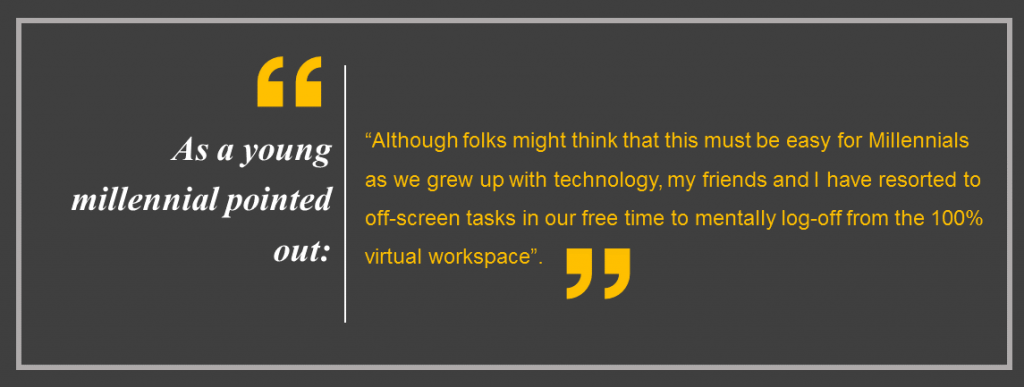
No surprises here that nearly seven out of ten of the younger generation (19-30 years – Chart 4.2) found innovative ways around the new challenge and were more productive.
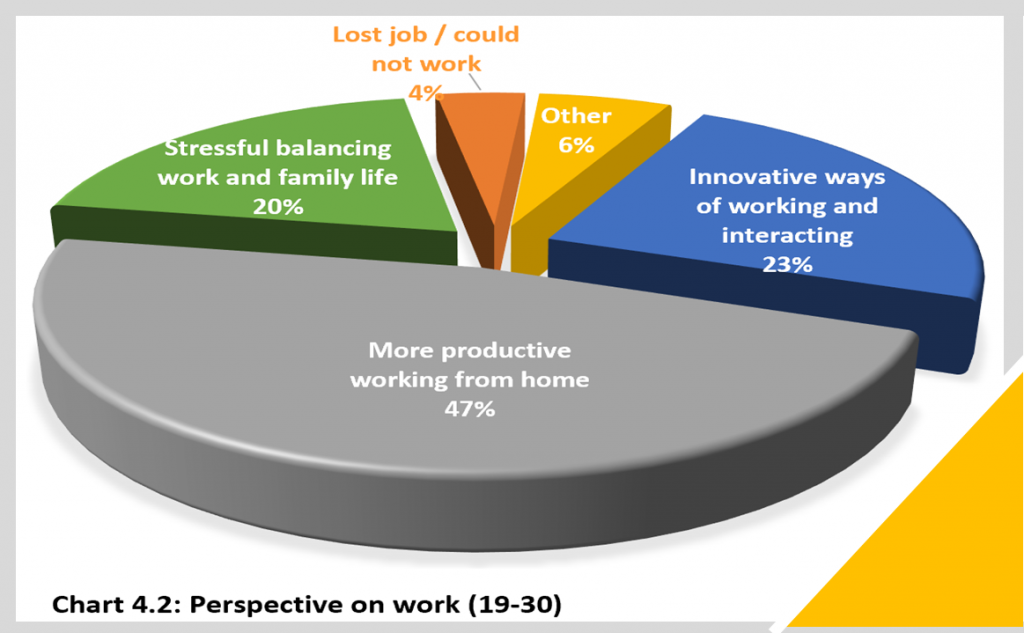
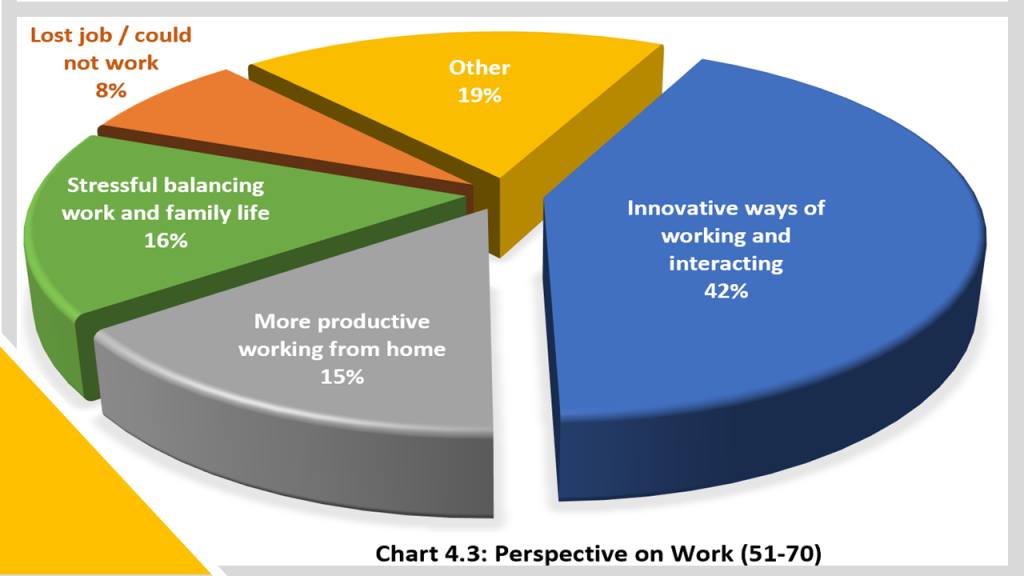
Interestingly this generation lays less claim to innovative ways of working than the older generation (51-70 years – Chart 4.3) – a generational shift on perception of the word ‘innovative’ perhaps?
FAMILY LIFE: Post-industrial world and the subsequent globalization have resulted in great social changes with the inevitable impact on family life. Succinctly described by American social psychologist K.J. Gergen as “the saturated family,” its members are characterized by a multiplicity of relationships as they are exposed to myriad of values, lifestyles and personalities resulting in their lives scattering in intensified busyness (very busy trying to keep busy!). The technological breakthroughs of this era (e.g. the car, telephone, television, computers, internet, jet plane, to name a few) have also been the mode of social saturation, which have contributed to family turmoil and a sense of fragmentation, chaos, and discontinuity.
The home, no longer a refuge of harmony, serenity, and understanding, may become the site of confrontation between people of different ages and genders, who have widely divergent personal ideologies and social affiliations.
The pandemic and enforced lockdowns caused all to pause, as if in mid-step, in their rushed daily routines. Our survey reveals that nearly three-quarters of our respondents re-discovered the joys of family life (Chart 5) and even those who were left stranded without their families (more than 10%), the value and centricity of a family as a refuge from the external chaos, was brought to the fore. Other technology platforms such as Skype and Facebook whose intent is to connect family members and keep them in daily contact in an efficient, affordable, and rapid manner, also did not seem to fill the void of physical absence. Combined with their intent to continue with this change to more family time in the future (Chart 7), are we may be looking at change in importance and role of family in the post-pandemic world.
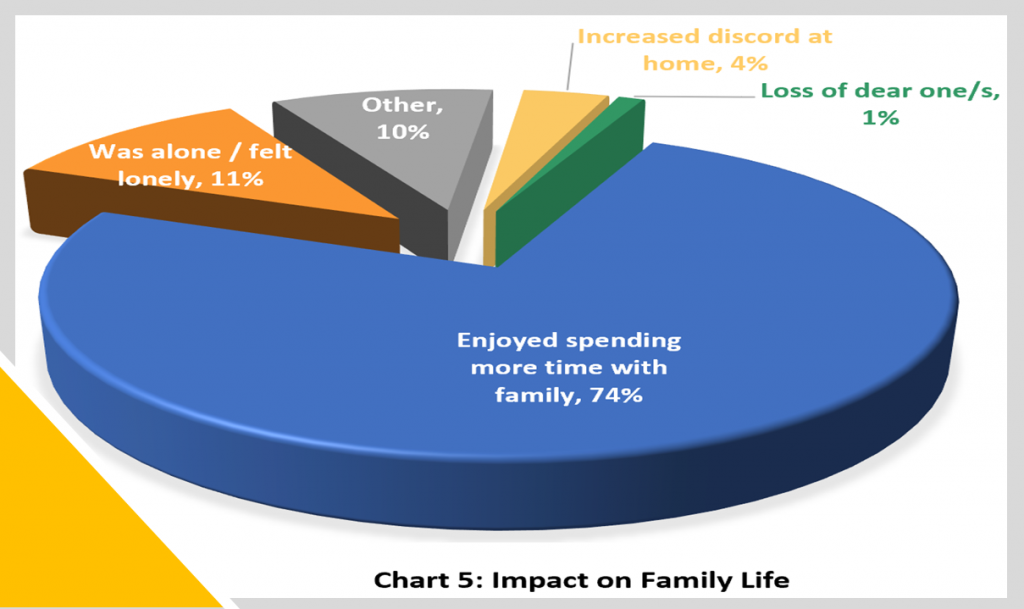
The role of family as a stress buster and source of much-needed solace, was brought out by the perspective shared by a young friend:
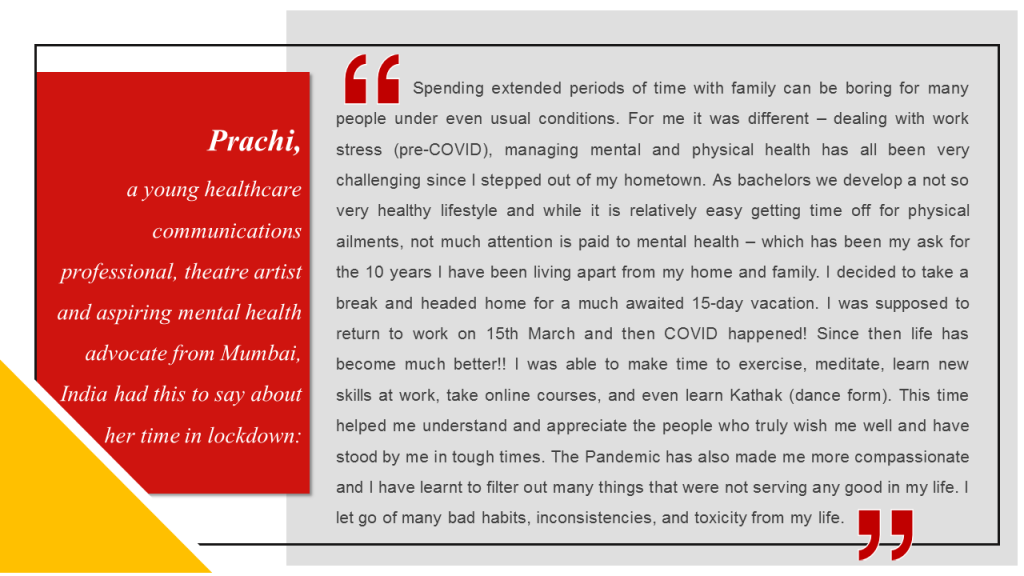
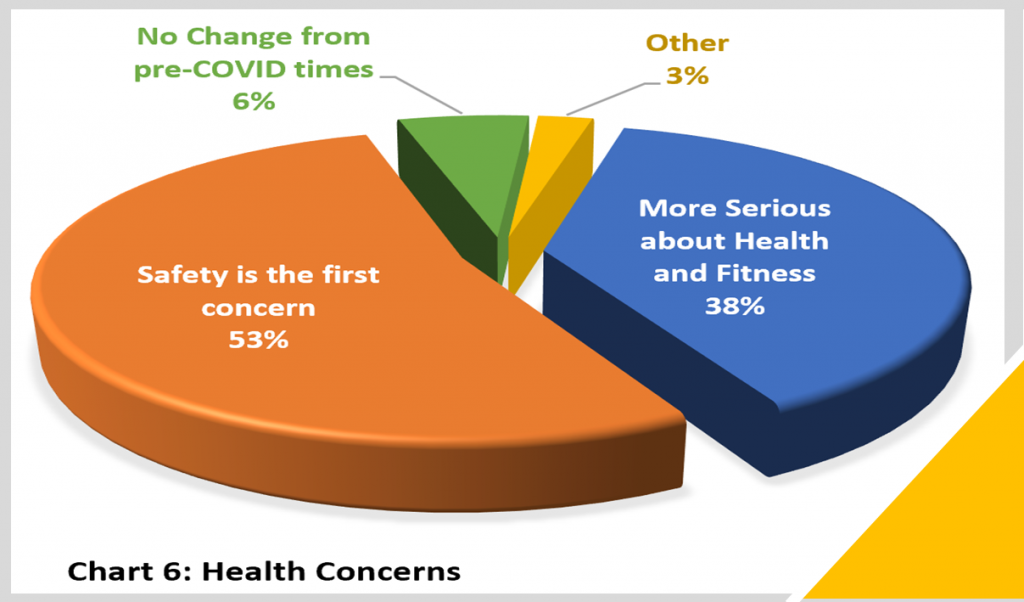
HEALTH & SELF CARE: The word ‘safety’ has acquired a new meaning in the wake of rapid transmission of COVID-19, which has made social distancing and maintaining hygiene an imperative. The survey reveals a considerable shift in attitude towards health, with an overriding concern for safety (Chart 6). Masks and sanitizers have perhaps become the two most visible and ever-lasting images and tools of these times. As economies gradually reopen to enable the process of recovery, the dominating concern for most countries is centered around containing the spread and the possible ‘second wave’ – hence strict guidelines have been stipulated for returning employers and employees about workplace hygiene.
This concern around safety is likely to persist well beyond the immediate and may even become an integral part of the ‘new normal’. A third of the respondents to this survey have unequivocally stated that safety (including wearing masks, social distancing, washing hands and sanitizing) would be one of the things that they would carry on in the coming future (Chart 7) – signaling perhaps a behavioral shift.
A concern for safety and requirements of social distancing has necessitated a greater use of online platforms for many activities, including making daily and essential purchases. For most families and homes, grocery shopping has become not unlike going to war – first, there is a whole protocol for dressing for the shopping event with masks, gloves etc. (putting on an armor, as it were), followed by a process flow for dis-infecting and storing purchases. Though a tedious process, a friend calls it ‘minor inconvenience’. On another front, the battle is to find all the articles you are looking for – something we took for granted in the pre-COVID times. And when you find it, we want to hoard! As one of the respondents said, they had “considerably moved up the threshold for going out. Hunter-gatherer instinct has kicked in …. go into hoarding mode while shopping”.
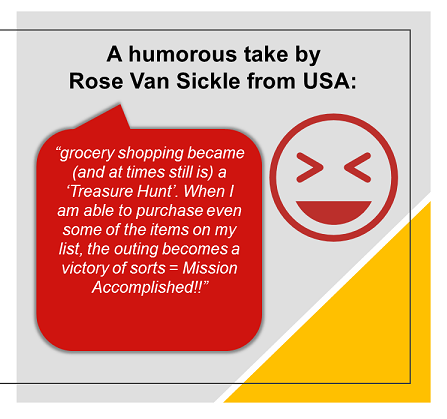
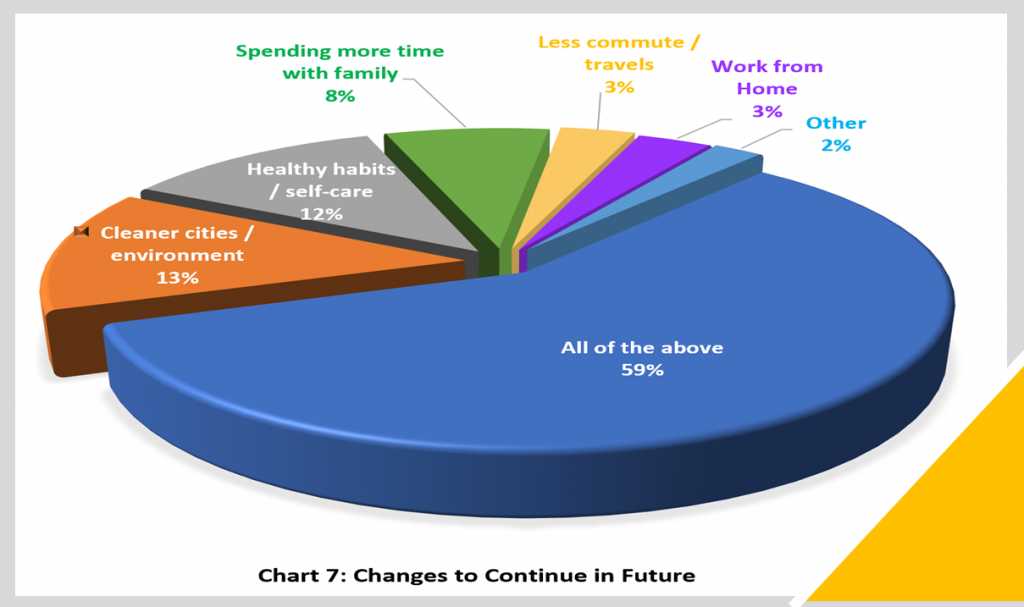
Coronavirus exploded on the firmament and turned our world inside out. It threatened our lives, snatched away loved ones, and rendered us jobless, with little or no means of earning a livelihood for an extended period. It forced us to change the way we live, the way we work and the way we interact with each other. But humans are resilient, and we are acquiring new survival skills, some of which may help us create a better world. Chart 7 reveals that we have begun to appreciate our families, our cleaner environment, and are coming to realize that we don’t have to be on the go all the time!
We even began to look within ourselves and a re-evaluated our lifestyles, our values, and our life goals. This introspection has thrown up new attitudes – gratitude, compassion, positivity, ‘live in the moment’, mindful of wastage, more tolerance, spirituality, ‘love more, appreciate more, complain less’, exploring self, ‘be more humble’, be more environmentally conscious – these are some that have emerged as the winners of this internal churning, as is also reflected in Chart 8. Some have found time and ways of giving back to the society, while others have avowed to give more time to charitable and social issues in the future.
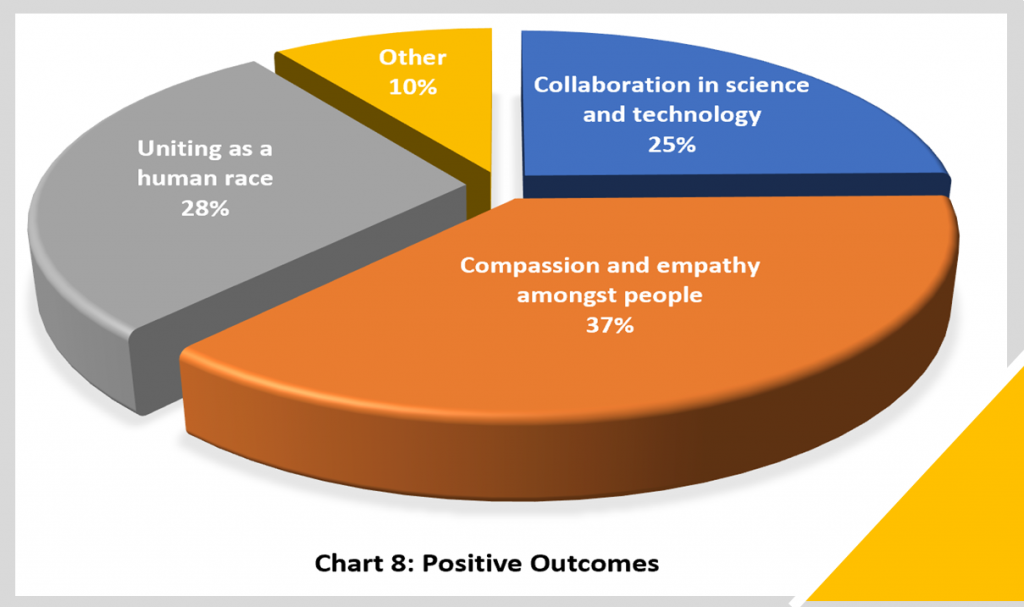
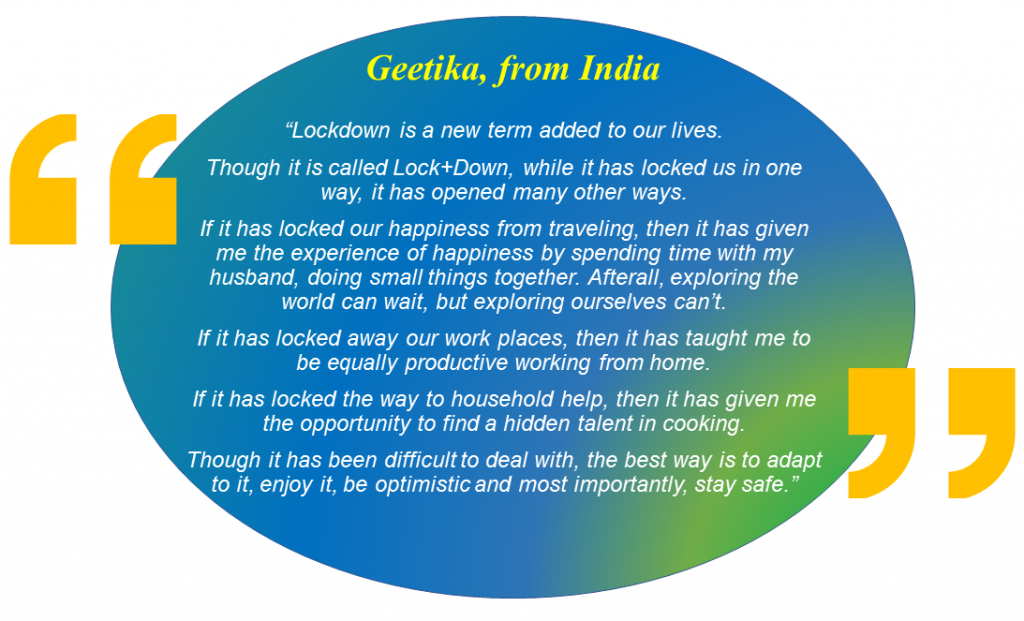
An event of pandemic proportions, which threatens the very survival of human race, is perhaps, giving rise to a collective conscience, which may be instrumental in creating a new world, once past the crisis. Change in attitude, coupled with many of the behavioral changes, as revealed by this survey, may bode well for the future as we rebuild a, hopefully, better tomorrow.
Bibliography:
Gergen, K.J. “The Saturated Family.” Networker, September/October 1991
ILO Monitor: COVID-19 and the world of work. Fifth Edition; 30 June 2020.
Acknowledgment: A special thanks to Dr. Rajshri Jobanputra, for her help in conceptualizing and implementing the survey, as well as her valuable inputs and ‘peer’ review of the completed article :).
——————— <><><><>———————
Author: Babita Shekhar is a Promoter, Step Foundation.

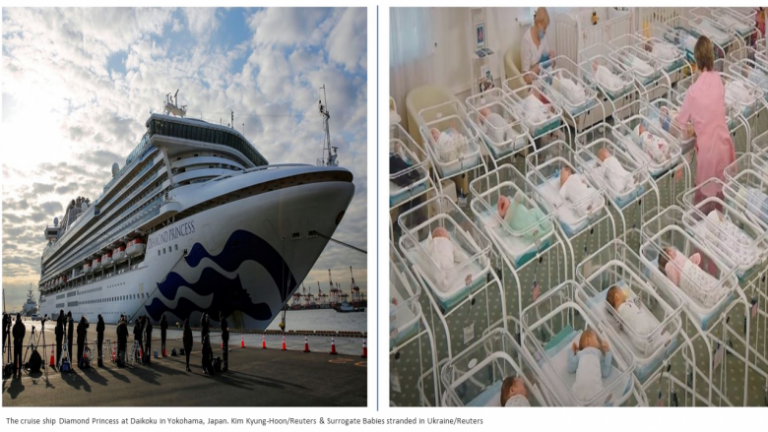
Visually appealing, compelling data, and beautifully articulated article Dr. Babita! This was a much-needed reflection exercise for all of us!
Thank you Dr. Rajshri. I appreciate the expertise and divergent perspective that you brought to our deliberations on conceptualization of the survey and article.
As we open up again, we all realize that the world has changed and we will need to change our perspectives and attitudes so that we all move towards a better tomorrow. Its a time for self-exploration and hopefully we live up to the expectation!
Outstanding observations and extremely well written!
Thank you Tim. Appreciate it!
Its been an interesting experience and I hope we can derive some useful learnings from it to guide our path forward.